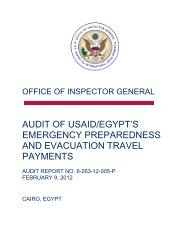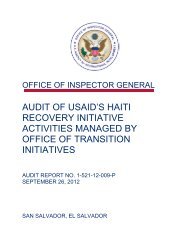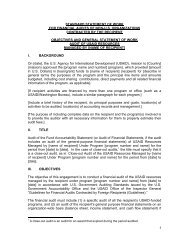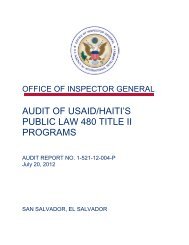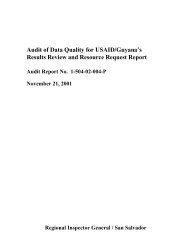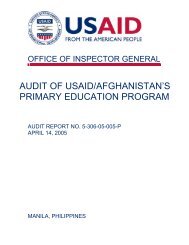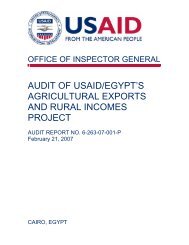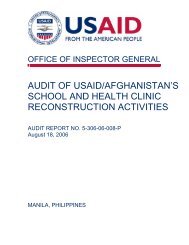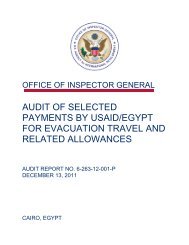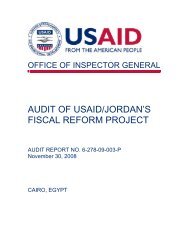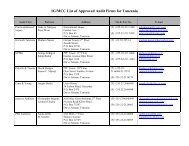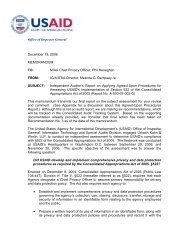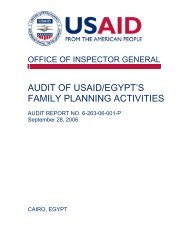USAID OIG Afghanistan and Pakistan Oversight Report, April-June ...
USAID OIG Afghanistan and Pakistan Oversight Report, April-June ...
USAID OIG Afghanistan and Pakistan Oversight Report, April-June ...
- No tags were found...
You also want an ePaper? Increase the reach of your titles
YUMPU automatically turns print PDFs into web optimized ePapers that Google loves.
The program was not fully achieving all of its core objectives, however. One area in which program effortsfell short was teacher training, the primary means of ensuring that program-supported students receive aquality education.An examination of the records for four tested provinces also disclosed that data reported under severalperformance measures relating to teacher training <strong>and</strong> other activities were not adequately supported,partly because of record-keeping deficiencies.Review of Security Costs Charged to <strong>USAID</strong> Projects in <strong>Afghanistan</strong> (<strong>Report</strong> No. 5-306-10-002-S,September 29, 2010)<strong>USAID</strong>/<strong>Afghanistan</strong> relies on private security contractors (PSCs) to supply an array of security services forcontractors <strong>and</strong> grantees that implement <strong>USAID</strong>-funded projects in <strong>Afghanistan</strong>. PSCs free up military forcesfor their core missions <strong>and</strong> provide protection to <strong>USAID</strong>’s implementing partners in hostile environments.<strong>USAID</strong>/<strong>Afghanistan</strong>’s practice has been to delegate responsibility <strong>and</strong> oversight for security to itsimplementing partners <strong>and</strong> factor the cost of security into their program budgets. These implementingpartners typically subcontract their security services to PSCs. <strong>USAID</strong> indirectly pays for PSCs when theimplementing partners submit their invoices, which include the cost of security services, for payment.In the past year, news reports have said that U.S. Government funds paid to contractors for reconstructionprojects were being siphoned off to Taliban insurgents in exchange for “protection” to prevent attacks. Forexample, one news article reported that <strong>USAID</strong> funds were ending up in the h<strong>and</strong>s of the Taliban through aprotection racket for contractors. Another article said that in southern <strong>Afghanistan</strong>, no contract could beimplemented without the Taliban taking a cut, sometimes at various steps along the way. Other newsreports said that PSCs were involved in the negotiations with insurgents. <strong>OIG</strong> staff met with one of thereporters involved to obtain additional details.<strong>OIG</strong> conducted a review of Edinburgh International’s security costs charged to the following three <strong>USAID</strong>fundedprojects in <strong>Afghanistan</strong> implemented by Development Alternatives Inc.:<strong>Afghanistan</strong> Small <strong>and</strong> Medium Enterprise DevelopmentIncentives Driving Economic Alternatives for the North, East, <strong>and</strong> WestLocal Governance <strong>and</strong> Community Development (LGCD)The review found no indication that Edinburgh International had misused <strong>USAID</strong> funds to pay the Taliban orothers in exchange for protection. However, there were indications that Afghan subcontractors working onthe LGCD project had paid insurgents for protection in remote <strong>and</strong> insecure areas of <strong>Afghanistan</strong>. Thepayments allegedly were made as part of a security arrangement with local communities that very likelyincluded the Taliban or groups that support them.<strong>OIG</strong> also found indications of pervasive fraud in DAI’s LGCD office in Jalalabad <strong>and</strong> indications of endemiccorruption in Nangarhar Province, where Jalalabad is located. It is conducting an investigation withmembers of the International Contract Corruption Task Force, including the Special Inspector General for<strong>Afghanistan</strong> Reconstruction <strong>and</strong> the Federal Bureau of Investigation, as well as with the local <strong>Afghanistan</strong>prosecutor’s office <strong>and</strong> the <strong>Afghanistan</strong> Major Crimes Task Force. In <strong>June</strong> 2010, DAI terminated ten LGCDemployees who were involved in the fraud scheme.<strong>USAID</strong> <strong>OIG</strong> <strong>Afghanistan</strong> <strong>and</strong> <strong>Pakistan</strong> <strong>Oversight</strong> <strong>Report</strong> 79



